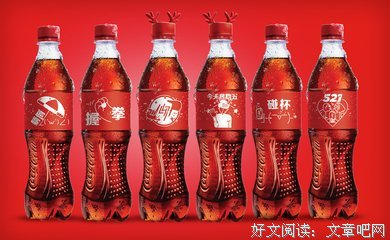
《可口可乐帝国》是一本由(美国)马克·彭德格拉斯特著作,华夏出版社出版的平装图书,本书定价:39.90元,页数:444,特精心从网络上整理的一些读者的读后感,希望对大家能有帮助。
《可口可乐帝国》精选点评:
●我这几天喝了几瓶可口可乐。
●论文指导~ lol
●挺有借鉴性
●有些事儿知道了未必好!还是不知道的好!
●资本主义、自由市场经济的排头兵,代表自由的美妙滋味
●Case-Study..
●当时是看完这本书对企业管理热血沸腾,也把可口可乐当作心中偶像= =结果在兼职可口可乐拖欠工资以后就激情不再- -
●一部商业史,值得读
●这本书,并不适合从头读到尾,不然你会对前面一对神药晕头转向。随便从中间翻开,找到感兴趣的小标题,或者是读这本书的正确方法。
●太厚了
《可口可乐帝国》读后感(一):小议公司传记
这大概是描写可口可乐公司「通史」最好的一本书。前面一半我看得很仔细,后面却只能大致看过,因为你发觉那一个个历史片断读罢之后既没用又没趣,干脆略过。而若想了解某一段历史,比如现代可口可乐海外扩张的历史,却又发现讲的太少。
所以若研究公司历史,我更希望看到类似于专题研究的那种,或者着重于某个历史阶段的「断代史」。
不管怎样,这本书的前半部仍值得一读,你可以看到初期的可口可乐公司是如何从众多的碳酸水作坊脱颖而出并发展状大的。
《可口可乐帝国》读后感(二):A wonder brand
如此好的书,怎么没什么人关注?
做marketing的一定要读,可以更了解商业的历史,以便作出卓越的选择.
几个亮点:
1. 19世纪尾声: 美国广告的汹涌澎湃;广告造就了某些品牌的滚滚利润,也成就了无数的富翁;
2. 药剂师的执着=> 品类的诞生
卓越商人的执着(阿萨)=>品牌的生根
卓越管理者的决定(伍)=>让Coke成为了美国代表
继承与发展(奥)=>曲折度过20世纪上
偏执狂的思路(郭)=>最终赢得利润. 他说,我们不一定都做正确的事,我们只是要得到最终的结果.
一部浩荡的品牌发展历史,相当于一部世界的商业史.
《可口可乐帝国》读后感(三):最有用的在附录
Coca-Cola Magic: Thirty Business Lessons
1) Sell a good product.
And if it contains a small dose of an addictive drug or two, all the better.
2) Believe in your product.
Make your product an icon and your job a religious vocation.
3) Develop a mystique.
An air of mystery, with a touch of sin, sells.
4) Sell a cheaply produced item.
Coca-Cola has always cost only a fraction of a cent per drink to produce.
5) Everyone who touches your product before it reaches the consumer should make substantial amounts of money.
For many years, everyone who touched it became wealthy, including bottlers, stockholders, wholesaling jobbers, and those who provided the trucks, bottles, pallets, dispensers, etc.
6) Make your product affordable to everyone.
o that a Third World denizen can purchase the beverage without going broke.
7) Make your product widely available.
- "Let's make it impossible ever, to escape Coca-Cola."
8) Market your product wisely.
How, when, and where you market and advertise your product will
ultimately determine its success.
9) Advertise an image, not a product.
quot;It isn't what a product is, but what it does."
10) Welcome an arch-rival.
quot;It keeps us, and them, on our toes and keeps us lean. We're magnificent competitors."
11) Use celebrity endorsements wisely − but sparingly.
For one thing, viewers may remember more about the star than the product. Coca-Cola has always remained the real star of its commercials.
12) Appeal to universal human desires.
The Coke message has universal appeal − by drinking this product, you will be self-assured, happy, popular, sexy, youthful, and well
coordinated.
13) Get 'em young.
Obviously, if you can achieve loyalty among youthful consumers, you've possibly fostered lifelong consumption.
14) Develop cultural sensitivity.
If you intend to sell your product around the world, do not trap yourself in an "Ugly American" image.
15) Hire aggressive lawyers.
If you succeed, you will undoubtedly need lawyers to protect your trademark, defend your good name, and scare off potential competitors.
16) Don't break the law.
It simply isn't worth it to risk the reputation of a huge multinational concern.
17) Become masters of influence.
Just because you don't break the law doesn't mean you must sit back and act like an angel.
18) Be patient but implacable. Plan for the long haul.
There will be bumps along the road, but set your goals on the horizon.
19) Adhere to simple commandments.
Genius lay in looking at the big picture and in concentrating on
a few elemental truths.
20) Be flexible enough to change.
quot;We live nervous."
21) Don't use defensive, negative advertising.
Maybe for an Avis or a Pepsi, comparative ads make sense. Maybe. You're still giving your
opponent free publicity, however.
22) Diversify only when necessary.
Coca-Cola, whose stock performance has been historically extraordinary, is one of the least diversified companies in the world.
23) Pay attention to the bottom line.
In the paranoid anti-Pepsi culture, Coke men were more concerned with share-of-market figures than with profits. Goizueta discovered, among other things, that the highly regarded soda fountain sector was actually losing money because of costly capital expenditures on metal five-gallon drums.
24) Terrify your employees.
quot;A certain degree of anxiety and tension has to exist for people to function at the highest level of their potential."
25) Promote from within.
The best Coca-Cola managers, almost without exception, have come up through the ranks, inculcated with the company mission.
26) All publicity is good publicity, at least after a certain point.
Even negative publicity can ultimately help a well-entrenched product.
27) Use cash wisely.
It made sense to borrow money if you could then re-invest it at a substantially higher rate of return.
28) Form joint ventures.
Another wise use of cash involved breaking a long-standing company commandment: thou shalt not own bottling plants.
29) Think globally, but act locally.
Regardless of its provenance, though, Coca-Cola has demonstrated its wisdom, dipping into its own history for guidance.
30) Pursue the halo effect.
The firm should appear to be in the vanguard of the environmental movement, progressive in race relations, setting up model programs for its Minute Maid migrant workers, creating nutritional soft drinks, and the like.
可口可乐1888年配方
柠檬盐酸咖啡因
香草精
液体古柯精化
柠檬酸
酸橙汁
食用糖
水
焦糖
7X食用香料:(橙子油,柠檬油,肉豆蔻油,肉桂油,胡妥油,橙花油,酒精,香草)